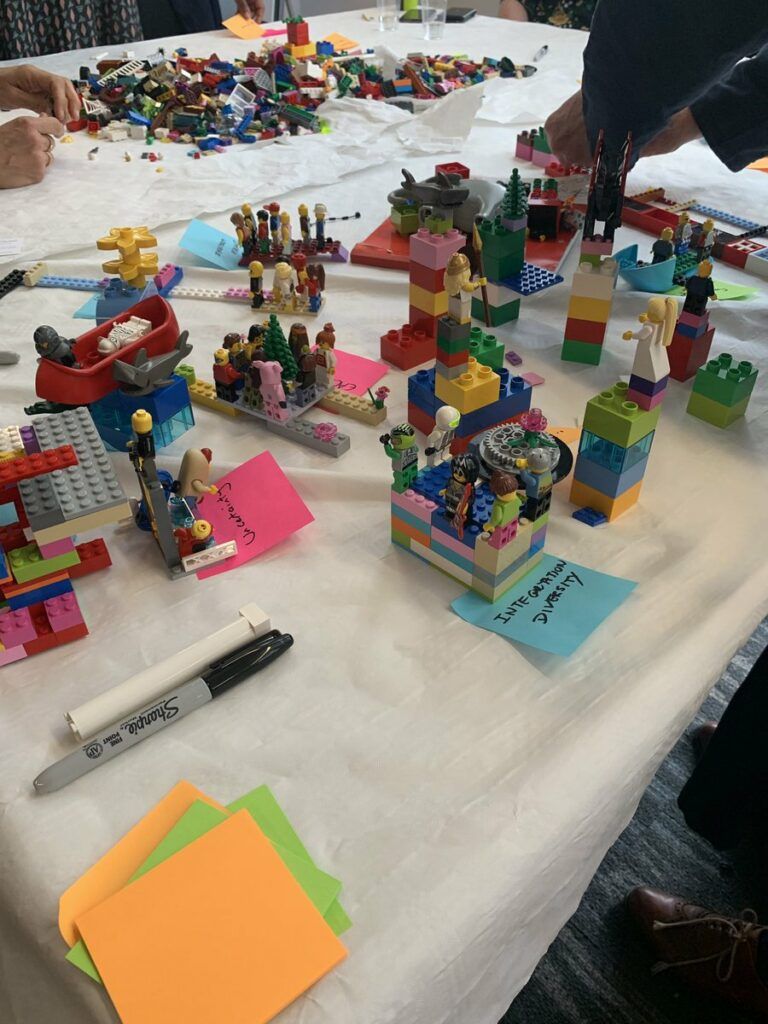LEGO Serious Play creates solutions to key challenges
Network Development Lead Sophie Bulmer writes about a recent workshop with a unique approach to problem solving.
If you follow UCLPartners on Twitter, you may have wondered what we were up to on Friday 5 July. Were those photos of people playing with LEGO? In a workshop? Yes, they were!
LEGO Serious Play is a facilitation methodology designed to encourage creative thinking, using the bricks to construct metaphors of organisational identities and experiences. Participants work through imaginary scenarios using visual 3-D LEGO constructions, hence the name “serious play”. As we are always looking for new and creative ways to approach problem solving, this was a perfect tool for our network to try out.
As always at our Improvement Network events, we had a real variety of roles and professions attending, including a Deputy Chief Nurse, improvement managers, clinical service managers, a consultant anaesthetist, an Associate Director for QI and the Chief Executive of a local Healthwatch. Attendees included a leadership team from the same organisation, using the opportunity in place of their usual management session.
Think with our hands
Over three hours, participants built a range of metaphorical models, representing their individual working life and key challenges facing health care – bringing to life issues such as ‘old power’, pessimism, silo working and Brexit. They then worked together in teams to construct solutions to those challenges. The model building was rapid and frequent, each iteration constructed in minutes and treated as a prototype, which would be enhanced or eliminated as the metaphor was developed. This prototyping approach encouraged creative flair, a more relaxed approach to risk and failure and a desire to explore multiple options, no matter how outlandish.
The workshop was enjoyed by all. Attendees spoke positively on the opportunity to be creative and have time out of their usual working environments. Using metaphors to express challenges meant that difficult situations could be described without confrontation, which made it a safe environment. It also helped them to see the challenges from a different perspective, which created new ideas for solutions. They also found it tiring. Most of the models had to be constructed in a few minutes, so they had to get into a relatively unfamiliar way of working very quickly.
Most of all, people had fun. The opportunity to think with our hands and get into that creative space isn’t something we often get a chance to do and it can help to open-up a whole world of possibilities.
Allow time to create
My personal reflection as an observer at the workshop was about how important it is to allow time for creativity. It’s an easy aspect to neglect, but it is a vital element if you want to develop strong teams, solve problems and foster innovation. As children we learn through play and this doesn’t stop when we become adults. LEGO Serious Play itself has firm foundations in established theory: constructivism – we learn when our experience and ideas interact; and constructionism – we learn when physically making an object.
It may not always be practical to run a LEGO session, but you can take the principles of prototyping, metaphor and storytelling using basic tools like pens and paper. If you lead a team, perhaps you can think about building in regular opportunities to access a more creative and imaginative space.
I’m quite lucky in my role – as I look around at different techniques and tools, exploring ideas that I think would be useful for our network to learn, I have the opportunity to work in this creative space for a lot of my time. My pledge at the end of the session was to keep creating more opportunities for our network to do the same.
More opportunities
So, what’s next? If you are interested in exploring different ways of working, why not book a place on our Introduction to Appreciative Inquiry workshop on 6 September? This fun and interactive session will show you how taking as asset-based approach to challenges can transform how you tackle organisational change – and will give you the tools to run your own Appreciative Inquiry session with your team.
Why not check out our other training and development opportunities for information on our regular offers, always free to those working in our partner organisations.
